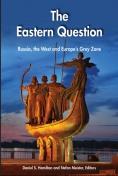Donald N. Jensen is a resident fellow at the Center for Transatlantic Relations at Johns Hopkins University’s School of International Studies, where he writes extensively on the politics and foreign policies of Russia and the former Soviet states. He is a regular commentator on post- Soviet affairs for CNBC, Fox Business, and the VOA Russian Service. From 1996 to 2008 he was associate director of broadcasting and director of research at Radio Free Europe/Radio Liberty, where he was instrumental in expanding the station’s broadcasting to Central Asia, Iran, Afghanistan, and the North Caucasus, and broadening its web presence. He served in Moscow and Sofia as a Foreign Service officer from 1985–1996, and was a member of the first ten-man U.S. team to inspect Soviet missile bases under the Intermediate Nuclear Forces Treaty in 1988. He received his BA from Columbia University and his MA and PhD in government from Harvard University. Andrew C. Kuchins is a senior fellow at the Center for Eurasian, Russian, and Eastern European Studies at Georgetown University, where he conducts research and writes on Russian foreign and security as well as domestic policy. He is a senior associate and former Director of the Russia and Eurasia Program at the Center for Strategic and International Studies. From 2000 to 2006 he was a senior associate at the Carnegie Endowment for International Peace, where he served as director of its Russian and Eurasian Program in Washington, D.C and as director of the Carnegie Moscow Center in Russia. He has also held senior positions at the John D. and Catherine T. MacArthur Foundation, Stanford University and the University of California at Berkeley. He holds a BA from Amherst College and an MA and PhD from Johns Hopkins SAIS.
In November 2015 Forbes Magazine named Russian President Vladimir Putin the world’s most powerful person for the third consecutive year. He finished ahead of German Chancellor Merkel, US President Obama, Pope Francis, and China’s leader Xi Jinping. “Putin continues to prove he’s one of the few men in the world powerful enough to do what he wants,” the magazine’s editors wrote.
Putin’s high rating was based largely on his ability to flout Western and global dictates and get away with it. Indeed, the Russian leader has never seemed more confident nor his grip on power more secure. In the past two years he has outmaneuvered the West in Syria and the eastern Ukrainian regions of Crimea and the Donbas. The faltering Russian economy and Western sanctions have failed to blunt Putin’s ambitions.
Read the entire article by clicking on the box at right.

